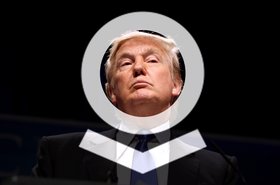In a hearing nominally about antitrust concerns, Google's CEO was asked whether his company shared American values - and whether it would support military and law enforcement agencies.
Republican congressmen also alleged that the company had interfered in the 2016 election, and was silencing Conservative voices. Google denies both claims, which have not been substantiated.
Sign the pledge
"Mr [Sundar] Pichai, in October 2018, Google dropped out of the running for a Pentagon contract to complete the Joint Enterprise Defense Infrastructure contract or JEDI contract, which was valued at more than $10bn," Congressman Ken Buck said during this Wednesday's antitrust hearing.
"Google's stated reason for removing itself from the bidding process is that the US military's project did not align with Google's corporate values and principles. This is the same US military that fights for our freedoms and stands as a force across the globe. These are the same soldiers, sailors, and airmen that sacrifice their lives to ensure that you have the freedom to build your company and set your corporate policies without fear of government interference, unlike in Communist-run China."
When Google dropped out of the JEDI competition, it indeed did say that it was partially due to values - referencing its June commitment to not develop AI that was likely to cause overall harm, or "weapons or other technologies whose principal purpose or implementation is to cause or directly facilitate injury to people." But the company admitted at the time that, values aside, it did not actually meet the requirements to bid for JEDI, lacking all the certifications required to compete.
Instead, it argued in October that JEDI should be split into smaller contracts, allowing it to compete for some. The contract has since been won by Microsoft, but that is being contested in court by Amazon.
Pichai said that his company was "proud to support the US government," adding that the company "recently signed a big project with the Department of Defense, where we are bringing our world-class zero-trust based cybersecurity approach to help protect Pentagon networks from cybersecurity attacks." We characterized the deal as 'small' when we covered it back in May.
"We have projects underway with the Navy, the Department of Veterans Affairs, happy to follow up with more," Pichai added. Indeed, research led by former Google employee Jack Poulson for non-profit Tech Inquiry earlier this year detailed the many contracts between big tech and the DoD. "On balance, Google's position became supporting the DoD's cloud and cybersecurity while avoiding direct contributions to weapons systems," Poulson noted.
The company often works through contractors and resellers, who win government awards - keeping Google's involvement off of the public record, bar FOI requests.
Meanwhile, former Google and Alphabet CEO Eric Schmidt is currently chairman of the Defense Innovation Board, where he advises senior members of the Department of Defense about AI, cloud, and other technological advancements, as well as the chair of the National Security Commission on Artificial Intelligence (NSCAI).
Buck continued: "I also find it very interesting that only months after making this decision to withdraw from the JEDI contract, Marine General Joseph Dunford, the chairman of the US Joint Chiefs of Staff, warned the Senate Armed Forces Committee that the Chinese military was directly benefitting from Google's work."
Dunford in 2019 said that “the work that Google is doing in China is indirectly benefiting the Chinese military." But he later clarified that he was speaking broadly about companies working in China: “This is not about me and Google," he said. "This about looking at the second- and third-order effects of our business ventures in China."
CEO Sundar Pichai met with Dunford to 'clarify' what Google did in China, he told the antitrust committee. "Compared to our peers it's very, very limited in nature," he added.
But the JEDI withdrawal and Dunford's initial comments made Rep. Buck "wonder what values Google and Communist-red China had in common?," he said.
"I asked myself: 'Self, is it that the Chinese Communist party imprisons Uighur Muslims in concentration camps? Could it be that China forces slaves to work in sweatshops? Maybe they align on the design to suppress free speech in Hong Kong? Did Google agree with CCP's decision to lie to the world about the Covid-19 pandemic?"
Since the passing of a hugely controversial and restrictive national security law in Hong Kong, Google joined other western firms in temporarily blocking authorities' access to user data. But the company still owns and operates a data center in the region, and did not respond to multiple requests for comment about what it plans to do with its facility.
"Then I thought about Google's Dragonfly experiment," Buck said, referencing a now mostly-canceled internal project to build a search engine for China. "I wondered if perhaps you agreed with the Chinese government's use of technology platforms to spy on its own people, and enforce draconian security laws.
"Maybe it's that your company is aligned with the Chinese Communist Party's corporate espionage policies, where the strategy is to steal whatever can't be produced domestically."
Google pulled out of Dragonfly due to internal opposition after media reports made staff aware of the project (some, such as Poulson, quit the company), as well as due to mounting political pressure. It has since also scrapped plans to build a cloud service in the country. "We have a very limited presence in China, we don't offer any of our services - Search, Maps, Gmail, YouTube, etc. in China," Pichai said.
When Congressman Buck's time ran out, Rep Matt Gaetz picked up the line of questioning." Mr Zuckerberg in his written testimony made the claim that Facebook is an American company with American values," he said. "Do any of the rest of you take a different view, that is to say the companies don't embrace American values?"
None responded. "It's great to see that none of you do. Mr Pichai, I'm worried about Google's market power, how it concentrates that power, and then ultimately how it wields it."
He continued: "Project Maven was a collaboration between Google and the Department of Defense that Google pulled out of citing ethical concerns, and you made the decision to pull out of that joint venture following receipt of a letter from thousands of your employees saying that Google should not be in the business of war."
The company did not renew the $9m the Maven contract after Gizmodo revealed its existence, leading to an internal revolt.
"Amid growing fears of biased and weaponized AI, Google is already struggling to keep the public’s trust," a petition, signed by some 4,000 Google employees, said. "By entering into this contract, Google will join the ranks of companies like Palantir, Raytheon, and General Dynamics."
Around a dozen Google employees are believed to have resigned over the Maven contract, with one departing engineer petitioning to rename a conference room after Clara Immerwahr, a German chemist who killed herself in 1915 over the use of science in warfare. “Do the Right Thing” stickers appeared in Google’s New York City offices, it was reported.
Gaetz continued: "My question Mr Pichai is did you weigh the input from your employees when making the decision to abandon that project with the United States military?"
Pichai reiterated Google's support for the military and the US government. He added: "We do take our employees' input into account, but it's one input, we make decisions based on a variety of factors."
"You did take their feedback into account," Gaetz said. "In fact, some of your Googlers have recently sent you a letter where they've asked you to exit other partnerships as a consequence of ethical concerns. They've asked you to stop doing business with American law enforcement, saying that police broadly uphold white supremacy, and that Google should not be engaged in any services to police - and as you well know, you provide some of the most basic services to police like email, but you also provide services that help keep our cops safe when they're doing their job.
"And so my question is that, here in front of Congress and the American people, will you pledge that Google will not adopt the bigoted anti-police policy that is requested in the most recent letter?"
Google employees have signed numerous letters protesting many of the company's practices, or potential practices - some the company listens to, some it ignores. Last year, employees signed a petition calling for Google not to do business with the US border agency, but we dug into contract details that showed it already worked with the Customs and Border Protection agency.
In June, more than 1,100 employees circulated a petition 'No Police Contracts,' amid the ongoing brutal police crackdown following the death of George Floyd.
The employees said that they were disappointed to “track down immigrants with drone surveillance footage” and claim that the company’s political action committee, funded by money from employees, donates “to racist politicians and white supremacists.”
The letter also criticized Google for highlighting the New York-based Clarkstown Police Department as a featured user of Google Cloud, the same agency that “has been sued multiple times for illegal surveillance of Black Lives Matter.”
At the time, Google said it would continue to work with law enforcement, but was reviewing more than 500 product suggestions from employees.
In his response to the Congressman, Pichai highlighted Google's "long track record of working with law enforcement when it is supported by due process and the law." Google is one of the top 500 contractors with the FBI, through supplying FISMA-certified Google Apps for Government, Tech Inquiry notes.
"We push back against overbroad requests, we are transparent about the requests we get, but we have a long history of following the law and cooperating with law enforcement," Pichai said.
But Gaetz said he was more concerned about the future: "To the law enforcement that are watching today, can they rest assured that under your leadership Google will not adopt these bigoted anti-police policies?"
Pichai dodged the question, reiterating that Google is "committed to continuing to work with law enforcement in a way that's consistent with law and due processes in the US."
"I greatly appreciate that," Gaetz said, before returning to the matter of China.
"You mentioned earlier in your discussion about China that your engagement with China was very limited, and yet Google has an AI China Center. The Chinese Academy of Sciences has published a paper that enhanced the targeting capabilities of China's J20 aircraft [sic]. You collaborate with Chinese universities that take millions upon millions of dollars from the Chinese military."
It is not so simple. Google haptic researcher Shumin Zhai was an author on a research paper for improving finger or stylus-based navigation using predictive AI. The paper was funded by the Chinese Academy of Sciences, which at the time said that the research "will have broad application prospects in military, medical, education, and digital entertainment.”
It is therefore plausible, but not guaranteed nor confirmed, that the research could be used for the J-20 jet, which has a huge 25" touch screen fighter pilots use. "We are not working with the Chinese military, it's absolutely false," Pichai said.
Gaetz had more: "In fact, one of your Googlers Fei-Fei Li, while under your employ, was cited in Chinese state media saying 'China is like a sleeping giant, when she wakes, she will tremble the world.'"
The statement was said publicly at Li's Shanghai Google Developer Day keynote, attended by the local and western press.
In her speech, she notes the phrase is a famous Napoleon Bonaparte quote she heard when growing up - some versions use 'astonish' instead of tremble, and the phrase has been used commonly, including President Nixon.
Li continued by saying that China had already awoken in the AI sector to become a world leader. “Today, I return to China with my team, hoping to begin our long and honest work to create the future. Still, I believe the science of AI has no borders. Neither do its benefits,” she said. Pichai said such work in China "is limited to a handful of people working on open source projects."
Gaetz continued: "Gosh, when the Chairman of the Joint Chiefs of Staff says that an American company is directly aiding China, when you have an AI Center, when you're working with universities, and when your employees are talking about China trembling the world, it seems to really call into question your commitment to our country and our values."
The congressman separately claimed that Google was suppressing his campaign emails as his father could not find an email in his inbox.
DCD has contacted Gaetz's office for clarification on whether US corporations can refuse military contracts or whether employees can voice disagreement with company practices, or if that is against American values. We also seek to clarify if he was aware the quote was from Napoleon. We have yet to hear back.








